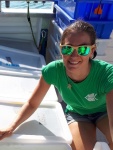

Mikaela Nordborg
mikaela.nordborg@jcu.edu.au
Recipient of an AIMS@JCU Scholarship
PhD
College of Science and Engineering

Mikaela Nordborg
mikaela.nordborg@jcu.edu.au
PhD
College of Science and Engineering
Cumulative impacts of oil pollution, UVR and climate change on coral reef organisms: Implications for risk assessment and spill modelling
Mikaela is a Swedish Australian marine ecologist with a background in climate change physiology and tropical ecotoxicology undertaking her PhD through the AIMS@JCU research program. She completed her BSc at the University of Gothenburg (UoG), Sweden, in 2011 producing a Bachelor thesis on the effects of projected future temperature and pH on the calcium content of eggs and larvae of a temperate lobster. As a part of her MSc she undertook coursework at UoG, focusing on marine monitoring and organic chemistry, and the University of New South Wales, Australia, focusing on quantitative marine science methods and Australian marine science. She completed her MSc at UoG through a collaborative research project with the Australian Institute of Marine Science (AIMS), Townsville, investigating the phototoxic effects of ultraviolet radiation and petroleum hydrocarbons on larval settlement of Acroporid corals. Additionally she has extensive experience as a coral spawning technician, supporting PhD candidates and researchers at AIMS throughout the coral spawning experimental period, as well as experience from the recreational diving industry.
Cumulative impacts of oil pollution, UVR and climate change on coral reef organisms: Implications for risk assessment and spill modelling
2017 to 2021
Project Description
The main aims of the project are to: (i) identify coral life stages which are most sensitive to petroleum hydrocarbon pollution; (2) investigate the cumulative impacts of petroleum hydrocarbon pollution, UVR and projected climate change on a model coral species; (3) model toxic threshold values for a range of coral reef organisms and derive local trigger values for tropical coral reef environments and (4) apply newly derived trigger values in hydrodynamic oil spill modelling.
Project Importance
The predicted increases in commercial shipping in tropical Australian marine environments, along with continued oil and gas extraction activities, increases the likelihood of petroleum hydrocarbon spills near Australian coral reefs. Additionally, projected future climate change means that effective management of reefs will rely on a detailed understanding of the effects of both individual pressures and potential interactions between multiple pressures. However, the currently available information on the effects of petroleum hydrocarbon pollution on coral reef organisms is limited. Only a handful of studies have included other environmental factors vital to quantifying the hazard posed by oil pollution today (e.g. ultraviolet radiation) and even fewer have considered future conditions. This project will substantially increase the available information on the effects of petroleum hydrocarbons on coral reef organisms, which will enable the derivation of relevant water quality guideline values for coral reef environments and focus future research efforts.
Project Methods
The project will utilise ecotoxicological approaches and methods to investigate the sensitivities of key coral reef species and life stages under environmentally relevant conditions. Treatment parameters for experiments (e.g. pollutant concentration and light intensity) will be monitored in accordance with best practices for petroleum hydrocarbon and cumulative impacts research. Sensitivity data will be used to model toxic threshold values for individual organisms, as well as communities, in accordance with accepted methods for statistical modelling and analysis. Community threshold values will then be applied in contemporary hydrodynamic oil spill modelling to facilitate an updated evaluation of risks posed by petroleum hydrocarbons to tropical coral reefs.
Project Results
The expected outcomes of the project will include a significant increase in high quality, petroleum hydrocarbon sensitivity data relevant to coral reef management. Additionally, the unprecedented investigation of potential interactions of projected climate change on petroleum hydrocarbon toxicity will contribute to estimate future changes to the hazards posed by hydrocarbons and focusing of future research efforts.
Keywords
Algae,
Climate change,
Coastal development,
Commercial use,
Controlled Environment,
Coral reefs,
Corals,
Crustaceans,
Echinoderms,
Human use,
Management tools,
Manipulative experiments,
Marine planning,
Modelling,
Molluscs,
Ocean warming,
Pollution,
Porifera (sponges),
Quantitative marine science